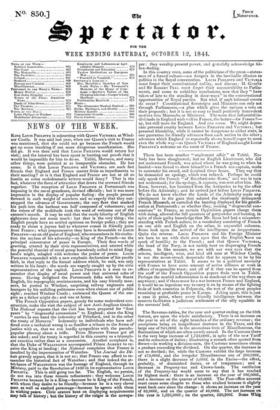NEWS OF THE WEEK.
KING Lours PHILIPPE is sojourning with Queen VICTORIA at Wind- sor Castle. It was said last year, when our Queen's visit to France was mentioned, that she could not go because the French would get up some insulting if not more dangerous manifestation. She did go. It was then said that Louis PHILIPPE would return her visit; and the interval has been spent in hunting out proofs that it would be impossible for him to do so. Tahiti, Morocco, and many other things, were pointed at as insuperable obstacles. He has come. Is it that Louis PHILIPPE and VICTORIA are such fast friends that England and France matter little as impediments to their meeting ? or is it that England and France are not at all so hostile as some melodramatic writers would fancy ? That is the fact, whatever the force of attraction that draws the crowned friends together. The reception of Louis PHILIPPE at Portsmouth was imposing in the naval grandeurs, devised officially ; but it was more impressive in the display of popular feeling : the people pressed forward in such weight of numbers and so eagerly that they out- atepped the advance of Government; the very fleet that marked lie path into the harbour was half composed of volunteers; and the voices of the multitude took the word of welcome out of the cannon's mouth. It may be said that the ready hilarity of English sightseers does not mean much : but that is the very thing ; the English people have no settled opinions on foreign policy ; they are ready to shout a joyous hail to whatever comes in friendly guise from France ; what prepossession they have is favourable to Louis PHILIPPE—as an old guest of England, who remembers in his exalta- tion the asylum of his adversity—as King of the French—as the principal conservator of peace in Europe. Their first words of greeting, uttered by their civic representatives, and uttered while the peaceful thunder of naval pomp harmlessly called to mind Eng- land's might, mingled with welcome the praise of peace. Louis PHILIPPE responded with a new emphatic declaration of his pacific faith, in that reply to the formal address which, he said, was only written in his heart : the words are eagerly caught up by the civic representatives of the capital. Louis PHILIPPE is a man to re- member that display of naval power and that universal echo of peace. Having delighted the Portsmouth folks with his fluent English, his topographic reminiscences, and his easy friendly man- ners, he posted to Windsor, surprising railway engineers and loungers by his unfailing politeness even when almost out of public sight ; reached Windsor Castle ; embraced the Queen of the em- pire as a father might do ; and was at home.
The French Opposition papers, greedy for some malevolent con- struction, make the visit the subject of new Anti-Anglican tirades. The National repeats that the visit has been prepared for " four years" by ""disgraceful concessions" to England ; since the King
carries in one hand the indemnity of Pritchard, and in the other the treaty of Morocco." Indemnity to individuals who have suf- fered even a technical wrong is so familiar a tribute to the forms of justice with us, that we can hardly sympathize with the pseudo- popular phrensy about a trifle. From Morocco France got all she asked; and the treaty is regarded in this country as a triumph- ant exaction rather than as a concession. Another complaint is, that the Duke of WELLINGTON accompanied Prince ALBERT to re- ceive the King at landing : the National complains that France is insulted by the impersonation of Waterloo. The Journal des De- bats gravely argues, that it is not so; that France can afford to re- member the historical fact of Waterloo ; and that indeed the at- tarlance of WELLINGTON was the homage of England, through its Mlnibtry, paid to the Revolution of 1830 in its representative Louis PHILIPPE. This is still going too far. The English, we persist, do not run into these remote refinements : they welcome Louis PHILIPPE because he is a King—because he is King of the French, with whom they desire to be friendly—because he is a very clever man as well as exalted personage—because he agrees with them 111 wishing peace. Civic orators bent on displaying acquirements may talk of history ; but the history of the vulgar is the newspa-
per : they worship present power, and gratefully acknowledge fel- low-feeling.
In this country even, some of the politicians of the press—states- men of a forced culture—see dangers in the inevitable allusion to politics in the Royal conversation. LOUIS PHILIPPE and VieToRLs. must forget their constitutional nullity, and discuss : M. Gurzfir and Sir ROBERT PEEL must forget their accountability to Parlia- ments, and come to unbidden conclusions, now that they " have taken of late to the standing in door-ways" in the conversational opportunities of Royal parties. But what if such informal events do occur ? Constitutional Sovereigns and Ministers can only act through Parliaments,—a plan which gives the nations a veto on their proposals ; but it is not so easy to instil positively benevolent motives into Monarchs or Ministers. The more that influentialin- dividuals in England wish well to France, the better—for France ?- ay, but still more for England. And vice versa. We might depre- cate personal enmity between Louis PHILIPPE and VICTORIA; but personal friendship, while it cannot be dangerous to either state, is one guarantee for friendly advances from each nation to the other ; advances which England so repeatedly shows herself eager to meet even the whole way—as Queen VICTORIA of England sought Louts PHILIPPE'S welcome on the coast of France.


























